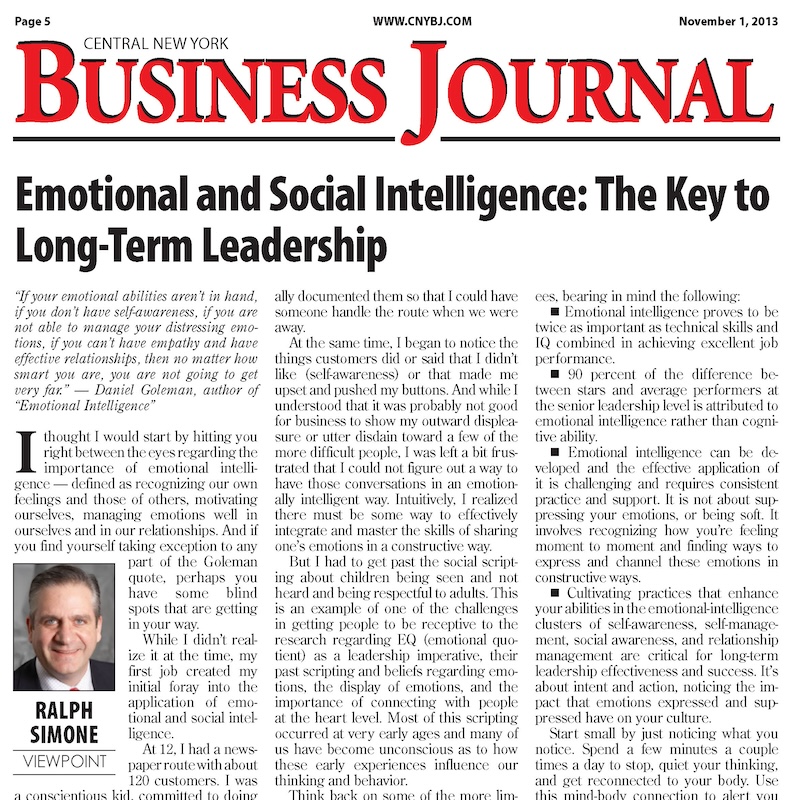“If your emotional abilities aren’t in hand, if you don’t have self-awareness, if you are not able to manage your distressing emotions, if you can’t have empathy and have effective relationships, then no matter how smart you are, you are not going to get very far.” — Daniel Goleman, author of “Emotional Intelligence
I thought I would start by hitting you right between the eyes regarding the importance of emotional intelligence — defined as recognizing our own feelings and those of others, motivating ourselves, managing emotions well in ourselves and in our relationships. And if you find yourself taking exception to any part of the Goleman quote, perhaps you have some blind spots that are getting in your way.
While I didn’t realize it at the time, my first job created my initial foray into the application of emotional and social intelligence.
At 12, I had a newspaper route with about 120 customers. I was a conscientious kid, committed to doing the right thing, and reasonably eager to please. However, it wasn’t too long into my experience delivering papers that I realized some of my customers — in fact, many more than I would have imagined — had different expectations regarding what constituted good customer service.
At first, I was surprised, but as my keen sense of social-awareness kicked in, I began making mental notes about my customers’ various likes and dislikes. I shared those notes with my able-bodied assistant, my 9-year-old brother Chuck, and eventually documented them so that I could have someone handle the route when we were away.
At the same time, I began to notice the things customers did or said that I didn’t like (self-awareness) or that made me upset and pushed my buttons. And while I understood that it was probably not good for business to show my outward displeasure or utter disdain toward a few of the more difficult people, I was left a bit frustrated that I could not figure out a way to have those conversations in an emotion- ally intelligent way. Intuitively, I realized there must be some way to effectively integrate and master the skills of sharing one’s emotions in a constructive way.
But I had to get past the social scripting about children being seen and not heard and being respectful to adults. This is an example of one of the challenges in getting people to be receptive to the research regarding EQ (emotional quotient) as a leadership imperative, their past scripting and beliefs regarding emotions, the display of emotions, and the importance of connecting with people at the heart level. Most of this scripting occurred at very early ages and many of us have become unconscious as to how these early experiences influence our thinking and behavior.
Think back on some of the more limiting statements or messages that you may have received, or perhaps delivered, regarding emotions and the display of emotions.
- Boys don’t cry.
- Showing emotion is a sign of weakness.
- There is no place for emotion in the workplace.
While I am certainly not advocating “emotions run amok,” I am suggesting a conscious and deliberate effort of strengthening the EQ of all your employees, bearing in mind the following:
- Emotional intelligence proves to be twice as important as technical skills and IQ combined in achieving excellent job performance.
- 90 percent of the difference between stars and average performers at the senior leadership level is attributed to emotional intelligence rather than cognitive ability.
- Emotional intelligence can be developed and the effective application of it is challenging and requires consistent practice and support. It is not about suppressing your emotions, or being soft. It involves recognizing how you’re feeling moment to moment and finding ways to express and channel these emotions in constructive ways.
- Cultivating practices that enhance your abilities in the emotional-intelligence clusters of self-awareness, self-management, social awareness, and relationship management are critical for long-term leadership effectiveness and success. It’s about intent and action, noticing the impact that emotions expressed and suppressed have on your culture.
Start small by just noticing what you notice. Spend a few minutes a couple times a day to stop, quiet your thinking, and get reconnected to your body. Use this mind-body connection to alert you in advance of the strong emotional reactions that you have to whatever is going on in your world.
“The range of what we think and do is limited by what we fail to notice. And because we fail to notice that we fail to notice there is little we can do to change until we notice how failing to notice shapes our thoughts and beliefs.” — Daniel Golem
Ralph L. Simone is founder of Emergent (formerly Productivity Leadership Systems) in Baldwinsville
Originally appeared in Central New York Business Journal November 1st, 2013

Comments (0)